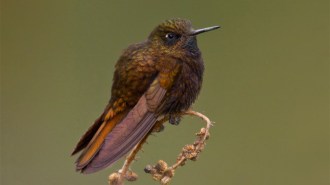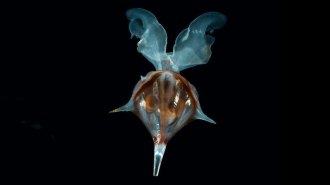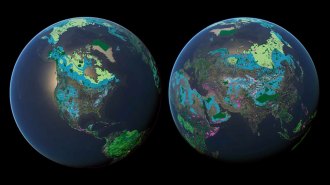All Stories
-
 Health & Medicine
Health & MedicineA sobering breakdown of severe COVID-19 cases shows young adults can’t dismiss it
Of about 3,200 people ages 18 to 34 hospitalized with COVID-19, nearly a quarter entered intensive care, and 10 percent were placed on ventilators.
-
 Climate
ClimateNew maps show how warm water may reach Thwaites Glacier’s icy underbelly
New seafloor maps around Thwaites Glacier in Antarctica reveal how deep channels could help warm ocean water melt the glacier from below.
-
 Science & Society
Science & SocietyHow COVID-19 worsened gender inequality in the U.S. workforce
Compared with men, the pandemic disproportionately hurt working women, including mothers of young children.
By Sujata Gupta -
 Animals
AnimalsThis hummingbird survives cold nights by nearly freezing itself solid
To survive cold Andean nights, the black metaltail saves energy by cooling itself to record-low temperatures, entering a state of suspended animation.
-
 Anthropology
AnthropologyA stray molar is the oldest known fossil from an ancient gibbon
A newly described tooth puts ancestors of these small-bodied apes in India roughly 13 million years ago.
By Bruce Bower -
 Animals
AnimalsSea butterflies’ shells determine how the snails swim
New aquarium videos show that sea butterflies of various shapes and sizes flutter through water differently.
-
 Science & Society
Science & SocietyCreative school plans could counter inequities exposed by COVID-19
Many K–12 schools this fall are virtual, which could widen the nation’s already large opportunity gaps. What are schools doing to reach all students?
By Sujata Gupta -
 Computing
ComputingHow next-gen computer generated maps detect partisan gerrymandering
The U.S. census will trigger a new round of redistricting beginning in 2021. Researchers have developed numerous tests to identify gerrymandering.
By Sujata Gupta -

Where do we draw the line between life and death?
Editor in chief Nancy Shute writes about the challenges of defining brain death and the first GM mosquitoes in the United States.
By Nancy Shute -

-
 Ecosystems
EcosystemsProtecting half the planet could help solve climate change and save species
An analysis lays out where new land protections could complement existing protected areas to achieve various conservation and climate goals.
-
 Life
LifeThis parasitic plant eavesdrops on its host to know when to flower
Dodder plants have no leaves to sense when to bloom, so the parasites rely on a chemical cue from their hosts instead.